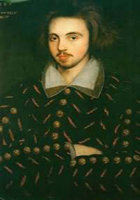Hero And Leander Comments
It lies not in our power to love or hate,
For will in us is over-rul'd by fate.
hen two are stript long ere the course begin,
We wish that one should lose, the other win;
...
Read full text
THREE: Such a life he needed not to be involved with, but that is CM his own being! Could be a person be gay by birth? Or had he done his choice? . This part of him I dislike.
TWO: the content is oft fully worded, archaic for now, but ordinary language in his period. I like CM's poems very much, the longer we read, the more meaning they get. His life is a very tragic one.
ONE: This part belongs to two other parts: the first and yhe second sestiad, and these three poems must be read altogether. Thank you for publishing Christopher Marlowe's poems, except archaic words,
This being merely a stanza of the original, it would be amiss to comment upon this portion out of context with the remaining work. Marlowe carefully, deliberately establishes the characters of both Hero and Leander in the preceding passages herein omitted, and even the particulars of the scene of their meeting, which to me decapitates the apparent theme of this stanza- the domination of fate over chance and even choice- from the preceding body of work. Certainly this is the most recognized portion of the work, but the final two lines, plucked like the two ripest grapes from the vine, do not quite satisfy the same as if they were encountered in the process of enjoying the entire branch of fruit upon which they were discovered.
May be, it is a part of the larger poem. But to me, the poet reflects his knowledge of human nature in love or in hate. Thanks a lot. What we behold is censur'd by our eyes. Who ever lov'd, that lov'd not at first sight.
This poem reminds me of war, and I personally feel offended. Look inbetween the lines, people! It's all about a male-dominated society! LINE 1 states, it is not in our power to love and hate, showing that females are the ones that love and males are the ones that hate. MARLOWE pushes the boundary by doing this in the WRONG WAY! ! @! ! Living in a male-dominated society is WRONG, and MARLOWE IS WRONG, WRONG, WRONG by writing this poem. The 19th amendemtn let women vote, therefore this poem is invalid in every way. 0.5/10.0
It lies not in our power to love or hate, For will in us is over-rul'd by fate. Yes, it often happen so.
Who ever lov'd, that lov'd not at first sight. Love this line.
That what every lover has in mind but not know until he experience like i DID TODAY
Critics called this work as worthy enough to be credited as Marlowe's master-piece! ! ! Where both deliberate, the love is slight: Who ever lov'd, that lov'd not at first sight.
Another poorly presented poem. Does no one check these poems? Apart from the spelling mistake, the poem is an excerpt from the great poem Hero and Leander, not the poem itself as this title suggests. “It lies not in our power to love or hate…” – but it lies in our power to control that love or hate.
The first line caught my eye. In life one should strive to forgive as JESUS taught. Then in ECCL: 3 there is a time of love and hate. Seems the inner person has to contend with these sudden emotions and learn control. A maturing process of the soul and mind.
Indeed whatever things happen in life seems to be the work of fate! Love at first sight is surely one such act in life nobody can deny! Success and failure also depend upon Fate!
This poem is wrongly titled! If you check Marlowe's poems it is listed twice. It plainly is not about Hero and Leander, but still a very good poem. His best! ! ?
This is writing at its best! Nothing beats a great love poem! There is much to appreciate in this fine piece. It flowed nicely, the delivery was powerful and there was much wisdom in it.

FOUR: A true and pure love poem, I like very much, but it seemed CM hid himself in his poems. A thought-provoking poem and very well worded, after all he got his Masters' degree and